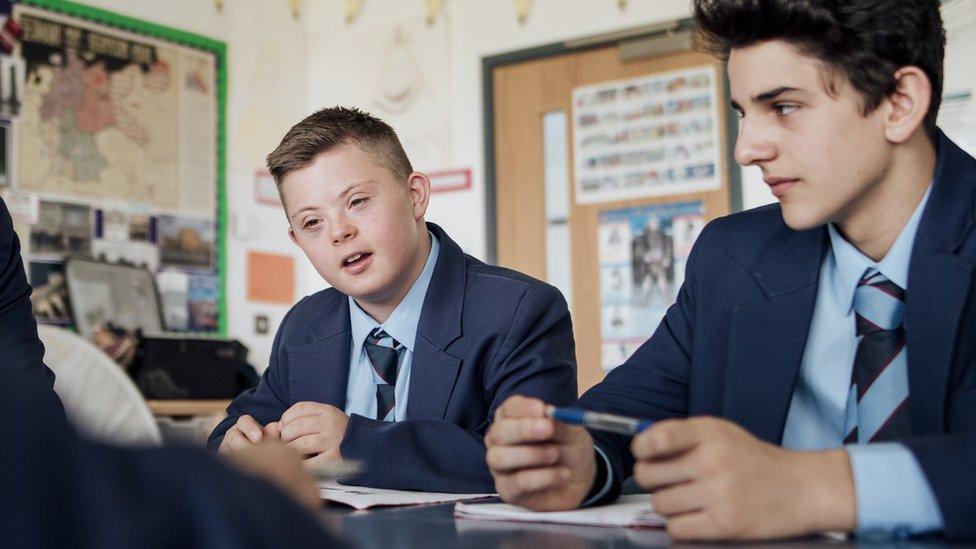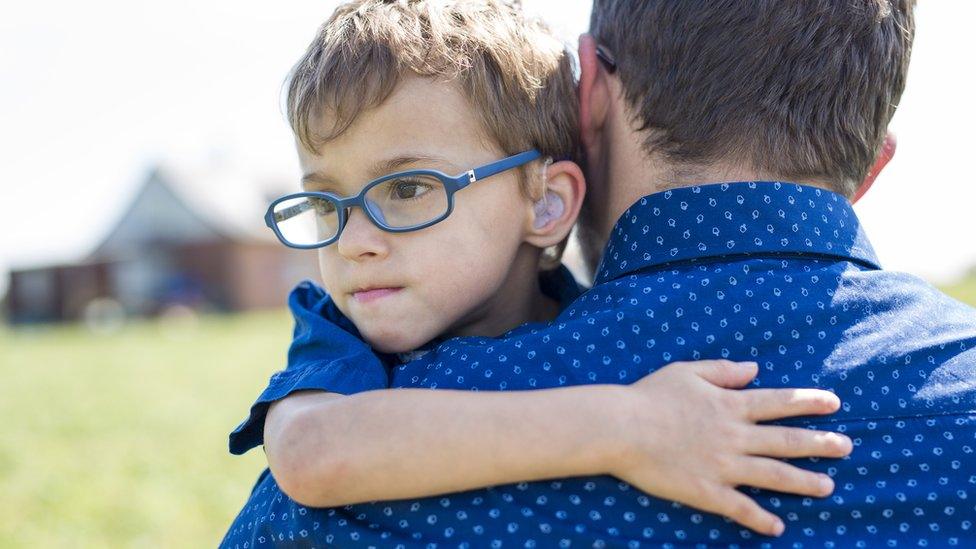Special needs pupils without care plans 'vulnerable'
- Published

Many children in England with special educational needs and disabilities (Send) are not getting the help they need, the National Audit Office warns.
The NAO says those children without an education, health and care plan (EHCP) are "particularly exposed" and are more likely to be excluded from school.
It also says councils are under growing financial pressure to meet demand.
The warning comes after the government announced £700m extra for special needs - as well as a major review, external of support.
Launching the review last Friday, Education Secretary Gavin Williamson said he wanted parents to know the government was "committed to boosting outcomes and ensuring the right support is in place for children with special educational needs".
But the NAO report says that, while some of the 1.3 million children in England with Send receive "high-quality support that meets their needs", many others are not getting the help they need.
It also raises concerns about "substantial unexplained variations" between different parts of the country.
The report says there are two categories of Send children:
the 270,800 children (21% of pupils with Send) with legally enforceable packages of support set out in EHCPs
the remaining 1,041,500 (79% of Send pupils) who do not have EHCPs, but are eligible for additional support at school.
The NAO says children without these plans are especially vulnerable.
"The significant concerns that we have identified indicate that many other pupils are not being supported effectively, and that pupils with Send who do not have EHC plans are particularly exposed," it says.
The report adds that being excluded from school was a significant risk.
"Pupils with Send, particularly those without EHCPs, are more likely to be permanently excluded from school than pupils without Send.
"In 2017-18, children with Send accounted for 44.9% of permanent exclusions and 43.4% of fixed-period exclusions."
The report also warns that the system for supporting Send is not "financially sustainable", with local authorities increasingly overspending their budgets for children with high needs.
"In 2017-18, 122 (81.3%) overspent their schools' high-needs budgets... The position has worsened since 2013-14 , when 71 local authorities (47.3%) overspent."
Rebekah and Debbie: The mums fighting for EHCPs
Rebekah, from Leicestershire, hasn't got an official diagnosis or EHCP for her nine-year-old son, who suffers from severe anxiety and socialisation difficulties.
She is often called by the school to pick him up and he is now on a part-time timetable, coming home at 11:30.
"Because he's out of school a lot, he thinks he's a bad person. He doesn't feel like a normal kid, which then makes the anxiety worse.
"If I can't access a full education for him, I'm looking at home schooling. Without an EHCP, we won't be able to access any other support or alternative school settings."
Debbie, from Somerset, agreed to a managed move to a smaller school for her daughter, 14, after her behaviour resulted in 13 exclusions last year.
The family is currently going through the EHCP assessment process, which Debbie says "would be so much pressure taken off" if successful.
"It's difficult when you're fighting against the school, whereas with a plan you feel the local authority can step in, it being a legal document."
Rebekah is waiting to see if her son will be diagnosed with autism, but in the meantime, she doesn't know what the future holds.
"It's just hard work. I can't work, I've had to give up my job to look after him. I don't know what the future holds - and it's a scary thought."
"It's one fight after another," adds Debbie, "and the kids are suffering and the education they're entitled to suffers and then you think 'Am I doing enough for my child?'"
'Life chances'
NAO chief Gareth Davies said access to the right support was "crucial to the happiness and life chances" of Send pupils.
"While lots of schools, both special and mainstream, are providing high-quality education for pupils with Send, it is clear that many children's needs are not being met."
Mr Davies said the NAO hoped the government's review would "secure the improvements in quality and sustainability that are needed".

A spokeswoman for the Department for Education said helping all children and young people reach their potential was "one of the core aims of this government".
"That is why the prime minister has committed to providing an extra £700m next year to make sure these children get an education that helps them develop and thrive as adults.
"We have improved special educational needs support to put families at the heart of the system and give them better choice in their children's education, whether in mainstream or special school.
"Last week we launched a review of these reforms, to make sure every child, everywhere, gets an education that prepares them for success."